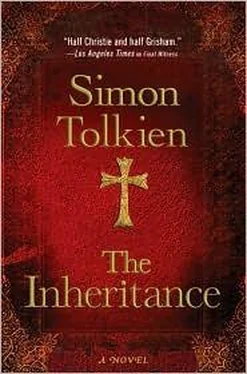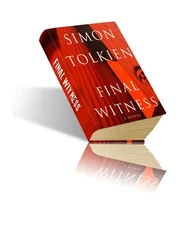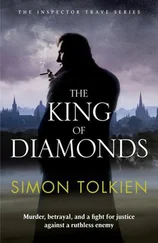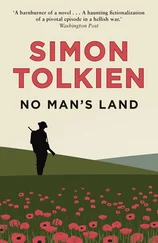Simon Tolkien - The Inheritance
Здесь есть возможность читать онлайн «Simon Tolkien - The Inheritance» — ознакомительный отрывок электронной книги совершенно бесплатно, а после прочтения отрывка купить полную версию. В некоторых случаях можно слушать аудио, скачать через торрент в формате fb2 и присутствует краткое содержание. Жанр: Полицейский детектив, на английском языке. Описание произведения, (предисловие) а так же отзывы посетителей доступны на портале библиотеки ЛибКат.
- Название:The Inheritance
- Автор:
- Жанр:
- Год:неизвестен
- ISBN:нет данных
- Рейтинг книги:4 / 5. Голосов: 1
-
Избранное:Добавить в избранное
- Отзывы:
-
Ваша оценка:
- 80
- 1
- 2
- 3
- 4
- 5
The Inheritance: краткое содержание, описание и аннотация
Предлагаем к чтению аннотацию, описание, краткое содержание или предисловие (зависит от того, что написал сам автор книги «The Inheritance»). Если вы не нашли необходимую информацию о книге — напишите в комментариях, мы постараемся отыскать её.
The Inheritance — читать онлайн ознакомительный отрывок
Ниже представлен текст книги, разбитый по страницам. Система сохранения места последней прочитанной страницы, позволяет с удобством читать онлайн бесплатно книгу «The Inheritance», без необходимости каждый раз заново искать на чём Вы остановились. Поставьте закладку, и сможете в любой момент перейти на страницу, на которой закончили чтение.
Интервал:
Закладка:
“When?” asked Thompson, interrupting. “When did you do that?”
“About seven years ago. The will had to be changed after Mrs. Cade died. But it was still fairly simple. The residual beneficiaries were the professor’s sons, Stephen and Silas.”
“And did you then have any further discussions about the will with the professor?”
“Not until earlier this year. It would have been about a month or so before his death that we first discussed new arrangements.”
“Tell us about those arrangements, Mr. Blackburn,” asked Thompson encouragingly.
“Well, basically he was talking about setting up a trust to run Moreton Manor House as a museum, housing his collection of manuscripts.”
“Who were the trustees going to be?”
“The professor hadn’t finally decided. Sergeant Ritter was going to be one of them.”
“What about the sons?”
“Probably not. The effect of the change of will would have been to disinherit them.”
“I see,” said Thompson, pausing to allow the jury to absorb the full implications of the solicitor’s last answer. “Now I’d like to show you exhibit fourteen. It’s the professor’s engagement diary, which was found on the desk in his study. It was open at the entry for June eighth. Read us the entry please, Mr. Blackburn.”
“Blackburn. Will. Three o’clock.”
“That’s right. Can you tell us anything about that?” asked Thompson.
“Yes. I had an appointment with Professor Cade at that time for him to give me final instructions, so that I could draw up the new will and trust documents.”
“But his death prevented him from keeping the appointment.”
“Yes.”
“Thank you, Mr. Blackburn. You’ve been most helpful. No more questions.”
Deep in the bowels of the Old Bailey, the gaolers allowed Swift a short interview with his client.
The barrister took off his horsehair wig and laid it down beside his file of papers on the iron table that separated him from Stephen. The headgear was useful sometimes for intimidating witnesses, keeping lines of division intact. But now Swift wanted to connect. He needed to get through to his client, make him understand that a change of direction was necessary.
“The will gives them the motive, Stephen. That’s the problem.”
“I wouldn’t have killed my father for money. Or anybody else for that matter. It’s so stupid. Can’t you see that?” Stephen’s sudden anger took the barrister aback, even though it was not the first time that Swift had seen it. The trial was clearly beginning to take a toll on the young man.
“Listen, Stephen,” he said. “You’ve got to calm down. Take a few steps back. Get a little less passionate.”
“Less passionate! You’d be passionate if you had to sit up there all day watching that old bastard twist everything round against me. I thought he was supposed to be impartial.”
“He is. But there’s not much we can do about it at the moment, and your anger just plays into the prosecution’s hands,” said Swift, putting sufficient urgency into his voice to make Stephen look him in the eye. “The jurors are watching you, Stephen. They can see you boiling over, and it makes them think you’re capable of doing what the prosecution says you did. Capable of killing.”
“Whoever killed my father didn’t lose his temper. You made that point yourself when you were cross-examining that policeman. You called it an execution-type killing. Not the same as a crime of passion.”
“No, it isn’t. But don’t bank on the jury being as clever as you, Stephen. The case against you is too strong for you to stay out of the witness box…”
“I want to give evidence,” said Stephen, interrupting. “I’d insist on it, even if you tried to stop me. They’re going to hear the truth from someone before all this is over.”
“But the truth isn’t always enough in this place, Stephen. Can’t you see that? It’s what the jury decides is true that matters.”
“No, I don’t see it. I’m not a cynic like you. I believe in something, even if you don’t.”
“I believe in trying to keep you alive.” Swift stopped suddenly. He’d have given a great deal to take back his words, but it was too late now. His need to get through to Stephen had got the better of his own judgement and had led him to break one of his most important rules: Never talk about execution to a client on a capital charge; keep him focused on the past and the present, but never the future. He’ll fall apart otherwise.
“I’m sorry, Stephen,” he said, breaking the awkward silence. “I shouldn’t have said that. Please forgive me.”
“Okay,” Stephen agreed softly. There was a tremor in his voice.
“Let me start again,” said Swift. “My point is that you have to keep your emotions in check, particularly when you come to give evidence. Thompson will try to provoke you into anger, and if he succeeds, he’ll turn it against you. He’s clever at what he does. I’ve seen him do it before. Many times.
“You saw it, members of the jury, didn’t you?” Swift said in sudden imitation of Thompson’s voice, and Stephen was struck by the accuracy of the impression. “You saw the way his fists clenched in rage when I asked him just a few simple questions. Imagine those hands on a pistol, members of the jury. Imagine the fingers clenching around the trigger.”
“All right,” said Stephen, holding up his hands. “I get the point. I’ll watch myself.”
“Thank you. Now there’s one other thing. I need you to let me widen the net.”
“What net?”
“The net of possible suspects. This foreigner in the Mercedes just isn’t enough.”
“But I’m not the only one who saw him. That police officer, the one who first came to the house, says in his statement that there was a car parked on the other side of the road. By the phone box.”
“Officer Clayton?”
“That’s right. He says that it drove off while he was buzzing to be let in at the gate.”
“I know he does,” said Swift patiently. “But the man could just have been making a phone call.”
“Not all evening he wasn’t. I saw him twice earlier, remember.”
“There’s only your word for that.”
“Then what about the Frenchman in the Mercedes that was stopped for speeding? At eleven fifteen. The time fits. You said that yourself.”
Swift could hear the anxiety creeping back into his client’s voice. He didn’t want to press Stephen any further, but he felt he had no choice.
“Don’t worry,” he said. “Clayton will give evidence, and I’ll make all the points about the Mercedes-the one at the gate and the one that was stopped for speeding. But the driver’s still never going to be anything more than a sideshow, whatever I say.”
“Why?”
“Well, for a start, we can’t explain how he could’ve entered the house. He can’t have come through the gate because you closed it on him when you went up there before seeing your father, and any other route of entry is scotched by this damn security system. I’m sorry to have to tell you all this, Stephen, but it’s no use denying facts. I know you think everything’s related to the blackmail letter and what happened in France fifteen years ago. But it’s all just too tenuous. We did what you asked us to. I sent an investigator over to Rouen, and the records office told him there were no close living relatives of the murdered family or their servants.”
“Maybe he didn’t look hard enough?”
“No, he did. I promise you he did. He went to Marjean as well, but the place is a ruin and everyone in the village said the same thing: no survivors. Same with the local police.”
“Why couldn’t you go yourself?”
“Because that’s not what I do,” said Swift, trying to keep the exasperation out of his voice. “I’m in court almost every day, and I can’t do two different jobs even if I wanted to. The man we sent is one of the best. You can take my word for it.”
Читать дальшеИнтервал:
Закладка:
Похожие книги на «The Inheritance»
Представляем Вашему вниманию похожие книги на «The Inheritance» списком для выбора. Мы отобрали схожую по названию и смыслу литературу в надежде предоставить читателям больше вариантов отыскать новые, интересные, ещё непрочитанные произведения.
Обсуждение, отзывы о книге «The Inheritance» и просто собственные мнения читателей. Оставьте ваши комментарии, напишите, что Вы думаете о произведении, его смысле или главных героях. Укажите что конкретно понравилось, а что нет, и почему Вы так считаете.












